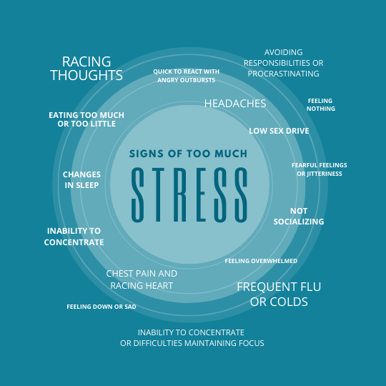Why Train Your Brain? Brain training combats stress. The stress response, also known as the fight/flight/freeze response is our primitive brain's automatic response to perceived danger or threats. Are you familiar with your stress response? How does it show up for you and when?

Your boss asks you to meet a deadline and all of a sudden you have sweaty palms, a racing heartbeat (flight response) and potentially may end up procrastinating or forgetting (freeze response) if you stay in this stress state for too long. The most difficulty arrives when we cycle through these states too often.
We find ourselves withdrawn, stressed, isolated, sleepless, addicted, burnt out, sick and/or unhappy! An over-active stress response isn't the only cause of these symptoms, but it can often contribute to making them worse.
Ways to Manage Stress with Brain Training
When we engage in brain training techniques, such as with the use of meditation, biofeedback, or neurofeedback, we are retraining our brains to be in a more relaxed, present and clear state-- able to respond to actual real threats as needed and in a "rest and digest" state at other times to be able to respond appropriately to incoming stimuli with skill, clarity and precision.
Also Read:

3 ways to increase success with your brain training
1. Consistency with Training Is Key

It seems like a no-brainer that showing up is half the battle, but that's really the truth! It's hard to create new habits that support our health and well-being-- in fact it seems like we're more easily drawn to the opposite at times.
Our brains would have us believe that we need our old habitual patterns to survive even if they appear more complicated to uphold and make life more difficult. However, we can trick ourselves in to creating new habits.
With meditation, we just start by sitting 5 minutes a day and often times we find we will want to sit a little longer. With neurofeedback, we make sure we keep regularly scheduled appointments and if training at home, set up a regular training schedule that we can keep. For myself, I really enjoy having someone else hook me up to my neurofeedback machine even if I can do it myself -- whatever makes it easier.
2. Eat Well & Sleep Well 
When we train our brains to be in the "rest and digest" state, we want to be able to also mirror that in our lifestyle--Resting and Digesting! This means that we need to take 7-9 hours of sleep every night (more if ill) and limit the use of caffeine, alcohol and sugar.
I don't like to sit here and finger wag at those who don't do these things -- but it is to say that diet and sleep do have an impact over the nervous system as well. Learn what foods are good or bad for the brain.
If we are not giving the nervous system added support to regulate, then we may find ourselves continuing in the same stressful patterns. So this isn't about shoulds, as much as how daily choices around your health have a supportive or adverse impact over stress level and the nervous system's natural desire to re-regulate into a calm, present state.
3. Other Supports For A Brain Reset
/forsest-bathing-crossroads.png?width=487&name=forsest-bathing-crossroads.png)
Think of all the things that stress you out. Write them down.
How many of these things can be "helped" and how many of these are just a part of circumstance that are out of your control?
For instance, I have to live in New York City as part of my work and the relationships I've formed here. Is this a stressful place for someone's nervous system? The answer would be a resounding YES. However, there is a real opportunity to find ways to regulate your nervous system in a busy metropolis.
Could you go for regular "forest bathing" as famous biohacker Dave Asprey calls it in his Top Ten Biohacking Tips for a Superior Brain & Body, walking around upstate New York on hiking trails a few times a month? Could you create morning and night rituals that are soothing and supportive-- such as waking up with a warm cup of tea on your patio and taking the time to do 10 minutes of free-writing, shutting off all screens an hour before bed at night?
Whatever it is you find soothing, relaxing and supportive are just the resources you might need to encourage the brain to reset.
We want continual reminders to the brain that you are safe and supported in the present moment. There is no right time to start this kind of brain training-- the best times might be in the midst of a divorce or a break-up, dealing with grief, pregnancy or during a major illness. Any time when we need even more support for our sanity and clarity.